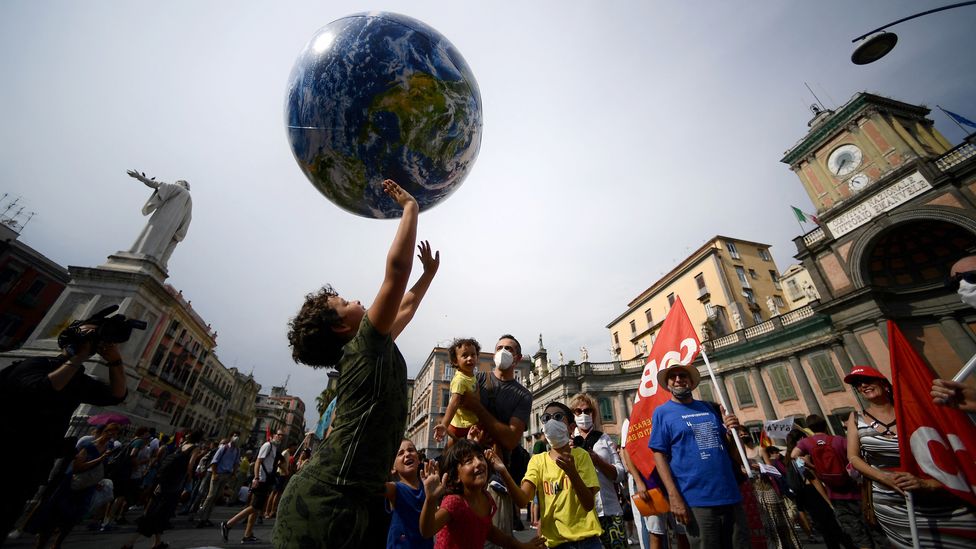 |
| Evolutionary Eusociologist & SocioBiologist, E.O. Wilson |
The Origin of Religion:
The Quality of Eusociality & Altruism
by R.E. Slater
“Eu-,” of course, is a prefix meaning pleasant or good: euphony is something that sounds wonderful; eugenics is the attempt to improve the gene pool.
The eusocial group contains multiple generations whose members perform altruistic acts, sometimes against their own personal interests, to benefit their group.
Eusociality is an outgrowth of a new way of understanding evolution, which blends traditionally popular individual selection (based on individuals competing against each other) with group selection (based on competition among groups).
Individual selection tends to favor selfish behavior. Group selection favors altruistic behavior and is responsible for the origin of the most advanced level of social behavior, that attained by ants, bees, termites—and humans.
When I first came across Edward Wilson's seminal work I was spellbound. Over a decade later I find that I still am when discovering how Wilson interweaved evolutionary biology with sociobiology to show that the necessary ingredient for the evolutionary mechanics of group selection is eusociality.
It seems that we are at another one of those inflection points where we must interject a few more new terms and attitudes about the Origin of Religion as we have been speaking to it's essential qualities of which eusociality is one.
In social, cultural and religious studies in the United States, the "epic of evolution" is a narrative that blends religious and scientific views of cosmic, biological and sociocultural evolution in a mythological manner. According to The Encyclopedia of Religion and Nature, an "epic of evolution" encompasses the 14 billion year narrative of cosmic, planetary, life, and cultural evolution—told in sacred ways. Not only does it bridge mainstream science and a diversity of religious traditions; if skillfully told, it makes the science story memorable and deeply meaningful, while enriching one's religious faith or secular outlook."Epic of evolution" originated from the sociobiologist Edward O. Wilson's use of the phrase "evolutionary epic" in 1978. Wilson was not the first to use the term but his prominence prompted its usage as the morphed phrase 'epic of evolution'. In later years, he also used the latter term.Naturalistic and liberal religious writers have picked up on Wilson's term and have used it in a number of texts. These authors however have at times used other terms to refer to the idea: Universe Story (Brian Swimme, John F. Haught), Great Story (Connie Barlow, Michael Dowd), Everybody's Story (Loyal Rue), New Story (Thomas Berry, Al Gore, Brian Swimme) and Cosmic Evolution (Eric Chaisson).
The Failure of Religion When It Doesn't Love
Now as I stated in our last posting, religious institutions like their civil counterparts have failed both themselves and us when not preaching the love of God as an essential component to creation's inner-workings.
In the past I've written about Christian Humanism as being the forerunner to the socio-political platform of Social Justice. How that yesteryear's church institutions of the 1700-1800s sought to uplift the plight of working children, women's equality, the fairness and rightfulness of non-White minority freedoms and liberties, and belatedly through Thoreau, Meir, and Leopold are charge to better tend and caretake nature about us.
As we read on about Edward Wilson we'll find that as a Baptist Christian he failed in his belief about the Christian religion as it became imprisoned by it's own doctrines and institutions. Wilson saw as we do today that his Christian religion had forgotten the essential tenant which bound it to its Creator-Redeemer and the Earth.
What is it?
Love.
The Quality of Love
Whether we call it by evolutionary eusocialism or post-Christian restorationism of essential faith grounded in humanitarianism and the building of ecological civilizations it still goes by the name of LOVE.
God's Love for us and creation is the essential ingredient to any faith and religion. If love is lost so too is that religion's faithfulness to it's evolutionary origins.
In love's place we have built - and continue to build - oppressive institutions refusing to see beyond their social groups practicing unnecessary holy acts and sacred performances all in the name of idolatrous fidelity.
God is love. True religion is love. Creation yearns to love and give love. God's quality of the divine "goes all the down even as it goes all the way up" the evolutionary order of the cosmos.
Cosmology's one main element deeply interwoven within it's relational composition is love.
We might call it generative care; valuative ethic; or benevolent outreach, but it's main enemy is selfishness, self-survival above all else, thoughtlessness, harm, abandonment, betrayal, and all such worthless qualities unworthy of God or creation.
What Is Eusociality?
So then, what else might we say of eusociality (I plucked these off the Internet)?
What defines eusociality?Living in a cooperative group in which usually one female and several males are reproductively active and the nonbreeding individuals care for the young or protect and provide for the group. eusocial termites, ants, and naked mole rats. eusociality.What is eusocial behavior?Eusociality, in which some individuals reduce their own lifetime reproductive potential to raise the offspring of others, underlies the most advanced forms of social organization and the ecologically dominant role of social insects and humans.Are humans eusocial?Humans, who are more loosely eusocial, dominate land vertebrates. "Eusociality has arisen independently some 10 to 20 times in the course of evolution," says Tarnita, a junior fellow in Harvard's Society of Fellows.What are the 3 requirements for eusociality?Eusocial animals share the following four characteristics: adults live in groups, cooperative care of juveniles (individuals care for brood that is not their own), reproductive division of labor (not all individuals get to reproduce), and overlap of generations (Wilson 1971).What are examples of eusocial groups?Eusocial behaviour is found in ants and bees (order Hymenoptera), some wasps in the family Vespidae, termites (order Isoptera; sometimes placed in the cockroach order, Blattodea), some thrips (order Thysanoptera), aphids (family Aphididae), and possibly some species of beetles (order Coleoptera).
What might E.O. Wilson describe
Eusociality as?
Eusociality as?
Scientific humanismWilson coined the phrase scientific humanism as "the only worldview compatible with science's growing knowledge of the real world and the laws of nature".[60] Wilson argued that it is best suited to improve the human condition. In 2003, he was one of the signers of the Humanist Manifesto.God and religionOn the question of God, Wilson described his position as "provisional deism" and explicitly denied the label of "atheist", preferring "agnostic". He explained his faith as a trajectory away from traditional beliefs: "I drifted away from the church, not definitively agnostic or atheistic, just Baptist & Christian no more."Wilson argued that belief in God and the rituals of religion are products of evolution. He argued that they should not be rejected or dismissed, but further investigated by science to better understand their significance to human nature. In his book The Creation, Wilson wrote that scientists ought to "offer the hand of friendship" to religious leaders and build an alliance with them, stating that "Science and religion are two of the most potent forces on Earth and they should come together to save the creation."Wilson made an appeal to the religious community on the lecture circuit at Midland College, Texas, for example, and that "the appeal received a 'massive reply'", that a covenant had been written and that a "partnership will work to a substantial degree as time goes on".In a New Scientist interview published on January 21, 2015, however, Wilson said that "Religion 'is dragging us down' and must be eliminated 'for the sake of human progress'", and "So I would say that for the sake of human progress, the best thing we could possibly do would be to diminish, to the point of eliminating, religious faiths."
Below is an article speaking to "Longtermism" which is new term speaking to that quality of eusociality from a similar but different perspective. Like process thought, as the years and eras roll by we will need to update our language to better accommodate and implant good, healthy ideas onto the plates and into the palletes of the mobilizing masses looking for direction and healing. Sharing God's love with one another is one of those things we must always be about doing with one another.
Peace,
R.E. Slater
March 25, 2023
RE Slater - Eusociality and the Bible, Part 1 of 2
RE Slater - Eusociality and the Bible, Part 2 of 2
Wikipedia - PreSociality, Subsociality,

* * * * * * * *
 |
| (Image credit: Filippo Monteforte/AFP/Getty Images) |
What is longtermism?
by William MacAskill
August 7, 2022
There is a strong moral reason to consider how the actions and decisions we take today affect the lives of huge numbers of future people, argues philosopher William MacAskill. Here he makes the case for longtermism.
Humanity, today, is in its adolescence. Most of a teenager’s life is still ahead of them, and their decisions can have lifelong effects. Similarly, most of humanity’s life lies ahead – an estimated 118 billion people have already lived, but vastly more people, perhaps thousands or even millions of times that number, are yet to be born.
And some of the decisions we make this century will impact the entire course of humanity's future.
Contemporary society does not appreciate this fact. To mature as a species, we need to embrace a perspective called longtermism – a way of thinking that differs greatly from the prevalent mindset today.
Longtermism is the view that positively influencing the long-term future is a key moral priority of our time. It's about taking seriously the sheer scale of the future, and how high the stakes might be in shaping it. It means thinking about the challenges we might face in our lifetimes that could impact civilisation’s whole trajectory, and taking action to benefit not just the present generation, but all generations to come.
The case for longtermism rests on the simple idea that future people matter. This is common sense. We care about the impacts of climate change, radioactive nuclear waste, and resource depletion not just because they affect our lives, but because they affect the lives of our grandchildren, and their grandchildren in turn. If you could prevent a genocide in a thousand years, the fact that "those people don't exist yet" would do nothing to justify inaction.
Many social movements have fought for greater recognition for disempowered members of society. Advocates of longtermism want to extend this recognition to future people, too. Just as we should care about the lives of people who are distant from us in space, we should care about people who are distant from us in time – those who live in the future.
This matters because the future could be vast. We have 300,000 years of humanity behind us, but how many years are still to come?
 | |
|
If humans were a typical mammal species, we would have 700,000 years still to go. But we are not typical. We may destroy ourselves in the next few centuries, or we could last for hundreds of millions of years. We can't know which of these futures awaits us, but we know that humanity's life expectancy – the amount of time our species has the potential to live – is huge. (Read more about how long humanity can survive for.)
We may stand at history's very beginning. If we avoid catastrophe, almost everyone to ever exist is yet to come.
Future generations therefore have enormous moral importance. But what can we do to help them?
First, we can make sure that we have a future at all. And, second, we can help ensure that that future is good.
Ensuring civilisation's survival
The first step is reducing the risk of human extinction. If our actions this century cause us to go extinct, there is little uncertainty about the impact on future generations: our actions will have robbed them of their chance to live altogether. The potential for a flourishing future would be entirely lost.
One of the greatest threats comes from pandemics. The tragedy of Covid-19 has made us painfully aware of how harmful pandemics can be. Future pandemics could be even worse as we continue to intrude into natural habitats in ways that increase the risk of diseases crossing over from animals to humans. Advances in biotechnology are helping us develop vaccines to protect us from disease, but they also are giving us the power to create new pathogens, which could be used as bioweapons of unprecedented destructive power.
If you could prevent a genocide in a thousand years, the fact that "those people don't exist yet" would do nothing to justify inaction
The community prediction platform Metaculus, which uses the collective wisdom of its members to forecast real-world events, currently puts the risk of a pandemic that kills over 95% of the world's population this century at almost 1%. If you're reading this in a relatively well-off country, you are more likely to die in a pandemic than you are from fires, drowning, and murder combined. It's as if humanity as a whole is about to take on the death-risk from skydiving – 1,000 times in a row. For such grave stakes, this risk is far too great.
We can act now to reduce these risks. Kevin Esvelt is a professor of biology at the Massachusetts Institute of Technology (MIT) in the US, and one of the developers of CRISPR gene drive technology. Gravely concerned by catastrophic risk from engineered pathogens, he founded the Nucleic Acid Observatory, which aims to constantly monitor wastewater for new diseases so that we can detect and respond to pandemics as soon as they arise. This technique was recently used to find traces of polio in the UK.
Esvelt also has championed research into far-ultraviolet (far-UVC) lighting. Promising early research suggests that some forms of far-UVC light can sterilise a room by inactivating microbial diseases, without harming people in the process. If we can bring down the cost of far-UVC lighting, and install it in buildings around the world, we can both drastically reduce pandemic risk and make most respiratory diseases a thing of the past. (Read more about how UVC can combat diseases.)
Other groups are focused on pandemic preparedness, too. The recently-established Oxford Pandemic Sciences Institute is working on speeding up the evaluation of vaccines for new outbreaks. Drug start-up Alvea is trying to quickly produce an affordable, shelf-stable Covid vaccine that can cheaply vaccinate everyone, rich and poor alike. They plan to use their platform to rapidly develop vaccines for future pandemics.
These efforts show that we really can help ensure civilisation's survival – while reaping enormous benefits for the present generation, too.
Trajectory changes
Ensuring the survival of civilisation isn't the only way to help future generations. We can also help to ensure that their civilisation flourishes.
One major way is by improving the values that guide society. Historical activists and thinkers have already achieved long-lasting moral improvements through campaigns for democracy, rights for people of colour, and women's suffrage. We can build on this progress to leave an even better world for our children and grandchildren. We can foster attitudes and institutions that give serious moral consideration to every person and sentient being.
 |
Humanity is like a teenager and has its whole life ahead of it (Credit: Robyn Beck/AFP/Getty Images) |
But this progress is by no means guaranteed. Future technology such as advanced artificial intelligence (AI) could give bad political actors far greater ability to entrench their power. The 20th Century saw totalitarian regimes rise out of democracies, and if that happened again, the freedom and equality we have gained over the last century could be lost. In the worst case, the future might not be controlled by humans at all – we could be outcompeted by superintelligent AI systems whose goals conflict with our own.
Indeed, several indicators suggest the possibility that AI systems may surpass human capabilities in a matter of decades, and it is far from clear that the transition to such a transformative, general-purpose technology will go well. People inspired by longtermism are therefore working to ensure that AI systems are honest and safe. For example, Stuart Russell is a professor of computer science at the University of California, Berkeley, and the co-author of the most widely-read and influential AI textbook. He cofounded the Centre for Human-Compatible AI, with the aim of aligning advanced artificial intelligence with human goals. Researcher Katja Grace runs AI Impacts, which aims to better understand when we might develop human-level artificial intelligence, and what might happen when we do.
There have been many ways to positively shape the future throughout history: from small acts like planting forests and recording information, to far-sighted moral advocacy whose effects have lasted through the present day.
However, the 21st Century could present a time of truly unprecedented influence over our destiny. The more power we have over our environment and over each other, the more power we have to throw history off course. If humanity is like a teenager, then she is reckless, driving at a faster speed than she can control.
Longtermism in practice
Longtermism is more than just an abstract idea. It has its origins in the effective altruism movement: a philosophy and community that tries to figure out how we can do as much good as possible with our time and money, and then takes action to put those ideas into practice.
The idea of longtermism has led to a tremendous upsurge in action dedicated to helping future generations. Hundreds of people have pledged part of their income, choosing to live on less so that they can donate to causes that benefit future generations. Major foundations, such as Open Philanthropy and the Future Fund, are making future-oriented causes a core philanthropic priority. Young people around the world are using longtermism to inform their career choices.
If we avoid catastrophe, almost everyone to ever exist is yet to come
Organisations, too, are orienting towards the long term across a range of areas. Our World in Data curates and presents information on the most important big-picture issues of our time. Community prediction platform Metaculus aggregates the views of thousands of volunteers to create testable forecasts of future events. The United Nations released an agenda with plans to foreground future generations through new representatives, reports, and declarations – all to be discussed in a "Summit of the Future" in 2023.
There's also a vibrant research community. Longtermism is still a nascent idea, and there's an enormous amount we don't know. How quickly will we move from sub-human to greater-than-human level artificial intelligence, and what should we expect to happen next? How likely is civilisation to recover after collapse? What drives moral progress, and how can we prevent the lock-in of bad values? How can we most effectively take action on the biggest risks we face?
Organisations that work on these topics include the Future of Humanity Institute and Global Priorities Institute at the University of Oxford, where I am chair of the advisory board, alongside the Centre for the Study of Existential Risks at Cambridge, the Stanford Existential Risks Initiative, and the Future of Life Institute.
Back to the present
Does advocating for future generations mean neglecting the interests of those alive today? Not at all. At the moment, only a tiny fraction of society's time and attention is spent explicitly trying to promote a positive long-term future. I don't know how much we should be spending, but it's certainly more than we currently do. As my colleague Toby Ord points out, the Biological Weapons Convention – the single international body tasked with prohibiting the proliferation of bioweapons – has an annual budget of less than the average McDonald's restaurant. Given how neglected and ignored future generations' interests currently are, even small increases in society's concern for its future could have a transformative impact.
What's more, action for the long term has benefits in the short term, too. As we've seen, preventing the next pandemic stands to save lives in both the present and the future. Innovation in clean energy helps mitigate climate change, but it also reduces the death toll of the 3.6 million people who die every year from fossil fuel-related air pollution. Much the same could be said for other efforts that stand out as longtermist priorities – such as efforts to promote and improve democracy, to reduce the risk of a third world war, or to improve our ability to forecast new catastrophes before they arise.
 |
Disease has always been one of the greatest threats facing humanity, and that remains the case today (Credit: Timothy A Clary/Getty Images) |
We don't often think about the vast future that may lie before us. We rarely worry about catastrophes that could imperil civilisation, or how new technologies could result in perpetual dystopia. And we almost never reflect on just how good life might become: how we might be able to give our great-great-grandchildren lives of great joy and accomplishment, free from stress and unnecessary suffering.
But we should think about such things. After all, the future is just as real as the present or the past. We overlook it merely because it’s out of sight, and therefore out of mind.
In our lifetimes, we will face challenges – like the development of advanced artificial intelligence, and the threat of bioweapons used in a third world war – that could prove pivotal for the entire future of the human race.
It's up to us to make sure we respond to these challenges wisely. If we do, then we can leave our descendants a world that is beautiful and just – one that can flourish for millions of years to come.
* William MacAskill is an associate professor of philosophy at the University of Oxford and a trustee for the Centre for Effective Altruism. His book on longtermism, What We Owe the Future, is due to be published in September 2022.**The author of this article, William MacAskill, is an associate professor of philosophy at the University of Oxford and is a co-founder of the Centre for Effective Altruism, Giving What We Can and 80,000 Hours. He is also the author of a new book on longtermism, What We Owe the Future.







No comments:
Post a Comment